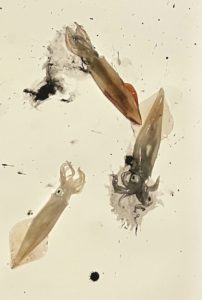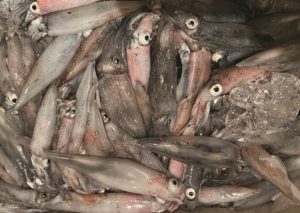PROVINCETOWN — “Call me, Ishmael,” I said, as Ish walked to his parked car. “Otherwise, I will pick you up just before sunset.”
“I’ll text ya,” he yelled over his shoulder.
“Oh, and wear a hoodie — a light one. It’s for the bugs.”
Ish is an old high school buddy, up from Brooklyn for a visit. I had regaled him with my squidding stories over the years; he was bent on going home with calamari for his Sicilian landlady.
The problem was, at that point in the season, I had yet to land a single squid. Or even, in fact, to properly rig my lines afresh for the squids’ pending arrival. But rest assured: as I write this, the squid are in. Heavy in spots. Best to get on it.

I grabbed the two smallest rods I had — the smaller, the better in squidding — and raced off to Blackbeard’s Bait & Tackle in Eastham, where they set me up with a nontangling double rig, for holding two jigs, and the jigs themselves, one heavier and one a light Yo-Zuri shrimp jig. All told, a $20 investment, per rod. Later, I added ice and beers to the cooler and grabbed a smaller bucket to hold the squid — I hoped — we were about to catch.
I pulled up at Ish’s campsite just as the shadows were getting long. He looked like a man who had never cringed and never had a creditor. By which I mean he was overdressed for the shower of ink that comes along with an evening’s squidding. But his smile showed he properly anticipated the joy of a night spent under the lights at MacMillan Wharf, where we’d soon be, like gamblers on a roll, hauling in squid as fast as we could cast our lines.
That was how I had described it, anyway. Like one of the best nights. I smiled back at him as he got in the car, imagining his fine threads coated with blobs of ink.
Now to the squid. “Ready?” I asked.
“I try all things, I achieve what I can,” Ish said.
It has always seemed to me that there are kind men and there are unkind men. Ish is the former to such a degree that I harbored a slight fear he might not be able to take responsibility for the death of a lowly squid, a creature whose natural life without an encounter with men like us would be about 10 months. During that short time, a squid sets up its next generation.
The squid come into our shores every summer to feed and mate. The best spot to catch them is under a light on a pier. MacMillan Wharf is, of course, the recognized premier spot around here.
No sooner had we pulled into the far end of the wharf than the fine, diminutive lady working the night shift at the harbormaster’s office homed in on us.
I recognized this lady from an unfortunate encounter two years ago. She had kicked me out that time, at 2 a.m. — long after the 11 p.m. curfew. The thing is, before she discovered me and my scofflaw ways, I had seen her enjoying a long chat with a friend, leaving him to squid to his heart’s content.
Today, my infraction was a different one, it seemed. “You can’t park here,” she said. “It’s for commercial users only.” I glanced around and noticed all the other squidder cars parked around me. And none of the trucks of the commercial guys who work out of the wharf.
“What is your name?” I asked.
“I am not telling you,” she said, and abruptly turned, retreating into her digs overlooking the harbor.
Thirty minutes later, she came back out. “It’s 10:30,” she said. “Pier closes at eleven.” There were exactly zero squid in our bucket.
The guy standing next to us, there with his son, was in a similar predicament. Clearly, he had promised his son a better night than two hours of nothing-in-the-bucket. “Ten years ago, you could fish here 24-7,” he said, his disappointment palpable.
I turned to Ish and motioned for him to join me in leaving. “C’mon. Squid must be seen before they can be killed,” I said. “I’ve got another spot we can check.”
The dejected father looked up for a hint, but I could not break the code and tell him. “Good luck,” I said, and turned to leave.
Ish looked down one last time at the incoming tide, silently surveying the vast blue eye of the sea, then the line of squidders, sitting under the lights, then the harbormaster’s window, through which, it seemed, she peered back, threateningly.
“All men live enveloped in squid-lines,” Ish said, apropos of nothing.
“What?” I asked.
He continued, “There is no folly of the beasts of the earth which is not infinitely outdone by the madness of man.”
“Well, I’ll tell you about some folly,” I said. “They’re ruining the oldest and most cherished activity here, the one thing on which the town was built. Squidding. It puts food on the table. And it’s socially distanced, too.”
“I get it,” Ish said. “But why?”
The guy next to me interrupted. “Seven years ago a bunch of ‘out of towners’ — restaurant folks from Boston, they say — blew through like a storm and made a mess of the pier,” he said. “That’s when the powers that be decided it would be easier to cancel the whole party than to police it.”

“A cherished tradition, gone.” I shook my head.
“There are some enterprises in which a careful disorderliness is the true method,” Ish said.
“C’mon, let’s hit the backup spot,” I said. And we did.
From our new vantage point, we saw a shoal of squid 20 yards square. They were moving, as they do, on the surface, zipping to and fro with celerity and ease, hunting in a pack.
Ish could not help himself. “Thar she blows!” he called out at the wealth in front of us, like he’d just drilled a gusher.
Indeed, we found our fortune that night. I am certain his landlady was pleased, as was his cleaner. The guy went home in a polka-dot shirt with the bucketful he gathered. All in all, the best night all summer — so far.
“There is one knows not what sweet mystery about this sea, whose gently awful stirrings seem to speak of some hidden soul beneath,” said Ish, quoting Melville once again, as he departed. “There is magic in it.”



